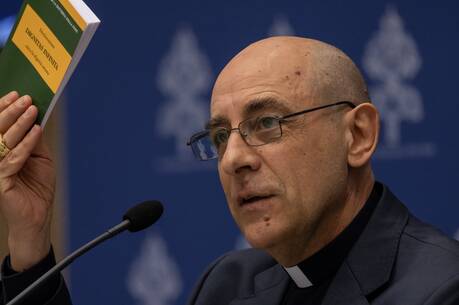“I need advice, about my marriage.” She was certainly direct, brushing aside the question I had proffered to open our conversation, about her four children, all of whom were in our parochial school.
“Okay...Tell me about your marriage.”
“Tim’s a good provider. He’s never lost his job. He’s not mean to the kids, or me, though he does yell at us when he’s been drinking.”
“Drinking’s a problem?”
“Yes. He stops by the pool hall every night after work, for an hour or two. He never comes home sober. In a sense, he never comes home. I feel as though I’m raising the children by myself.”
“You’ve spoken to him about the drinking?”
“So many times. It only makes him angry. Father, he’s not the man I married. Some nights, I have to bring him home from the pool hall, but he doesn’t think it’s a problem.”
I had been to alcohol awareness workshops, and, although I’m condensing the conversation, what I thought needed to happen seemed clear. “Jeanette, you’re enabling his drinking. I don’t mean that you’re encouraging it, but you are allowing him to drink by pulling his weight at home, by staying with him instead of making it clear that his drinking is unacceptable.”
“You think that I should leave him?” She was genuinely confused.
“I doubt that he’ll ever quit drinking if you don’t.” Jeanette stopped speaking. She stared into space, clearly considering my advice. Thinking about those words, many years later, I realize they weren’t what she had envisioned. She had expected her pastor to tell her to do her duty, to stand by her man, to accept him for better or worse, as she had promised.
But she did consider, really consider, what I had said. I could see it in her face. In the silence, she tried to picture what it would mean to leave him. Finally she said, “Father, I can’t do that. I can’t do that to my children, or him.”
“I can certainly understand why you don’t want to do it, but you’re probably facing a life-time of his drinking if you don’t.” I could tell that she understood this to be true, that she, of all people, could foresee her future.
“But it’s what I have to do,” she said simply. Shortly after that, our conversation was finished. What had happened? She had come looking for one answer; she had received another; she had taken sometime to ponder what she had heard; and she had determined her own path.
Provided that I’ve recounted the event accurately enough, those familiar with alcoholism will want to insist that she made the wrong decision, that her sense of duty condemned herself, her children, and even her husband to a sort of hell on earth. They would point out that our response to substance abuse needs to be counter-intuitive, that only “tough-love”is effective in such a situation.
That’s certainly what I believed at the time, and I wouldn’t say that I’ve changed my mind. I’d rather say that I’ve opened my mind to more. I have no doubt that the experts in addiction are as correct in their counsel as fire experts are when they advise us of the best way to leave a burning building. If you know that you’re supposed to get out, what needs to happen is clear. But then, there are people, like firefighters, who don’t get out, because they know their duty, before God, lies within the burning building. There’s a difference between knowing correct procedure for dealing with a problem and discerning what the Lord asks of your life.
One could put it another way. Jeanette came to stare at the cross life handed her, not the flighty one each of us pictures porting in our imaginations. She already knew its pain. She could see its course and its probable conclusion, and, in silent communion with her God, she accepted it as her cross, her burden to bear.
There are those who would want to say that all of this is nonsense, that fully living a human life means avoiding suffering at any cost, that one should never choose a path of pain. There are those who would add that this the problem with religion in general and the Church in particular, that they seduce us into accepting sufferings that shouldn’t be borne.
Then we come back to the one who made the same choice. “Jesus began to show his disciples that he must go to Jerusalem and suffer greatly from the elders, the chief priests, and the scribes, and be killed and on the third day be raised” (Mt 16:21). What are we to make of his example? Or better — how does his Calvary connect to Jeanette’s?
First, suffering is unavoidable. You can spend your life running from it, but you’ll not escape it. And if you run, your flight itself will become an unrecognized torment. In the end, we choose our sufferings as surely as we choose our joys. We think of both as inevitably coming our way, and they do. But we’re not the passive playthings of either our sufferings or our joys. They’re like waves through which we steer our little craft of life, with every choice we make. You can’t avoid every suffering; you can’t pursue every joy. But you do decide who you become as you respond to each: embracing, shunning, abstaining, weathering, controlling, fighting, allowing.
If the goal were simply to avoid suffering, Jeanette knew what she had to do, but one is naive if one thinks that sufferings and joys ever neatly line up on opposite sides of any decision. It’s a cross to stay with a drinking husband; it’s a cross to leave one. In the end we’re left with silent, harrowing choices. Hopefully we make those decisions, prayerfully pondering these words of our Lord, which are direct in import as they are mysterious in the moment of our decision. “Whoever wishes to come after me must deny himself, take up his cross, and follow me. For whoever wishes to save his life will lose it, but whoever loses his life for my sake will find it” (Mt 16:24)
Terrance W. Klein








Jesus' cross was rather different from the everyday sufferings of life. It was the persecution by the religious and political authorities who did not like Jesus' challenge to them.
A modern analogy would better be the murder of Martin Luther King or Archbishop Romero.
I think there is an analogy here with everyday sufferings arising from the human condition, but I'm uneasy that we're missing the radicality of the gospel by too easy associating every suffering with the cross.
The central message of the cross would seem to be the need to challenge authority despite the resultant persecution.
God Bless
I've recently discovered the "Welcoming Prayer" as a way in which I can better carry (or "handle") the crosses of my life. When the suffering presents itself - usually, for me, in the form of fear, anger, confusion, worry - I let myself feel it in my body. Where is the tightness? What is going on with my breathing? After awhile with this, I welcome it. This is a way of not suppressing the suffering or running away from it. Then I go back and forth between feeling the suffering and welcoming it. In time, it become easier to carry. I can do this. There is then a litany of a prayer with which one can "let go", or "give to God" the suffering.
According to Thomas Keating, this welcoming prayer "is practice that actively lets go of thoughts and feelings that support the false-self system. It embraces painful emotions experienced in the body rather than avoiding them or trying to suppress them. It does not embrace the suffering as such but the presence of the Holy Spirit in the particular pain, whether physical, emotional, or mental. Thus, it is the full acceptance of the content of the present moment. In giving the experience over to the Holy Spirit, the false-self system is gradually undermined and the true self liberated."
That is, insofar as we are members of Christ through baptism "into his death and resurrection", when we lift up our suffering to Him in prayer we offer a spiritual worship to the Father in the Son through the Holy Spirit and so accompany Jesus in the very redemption of humanity!
Yes, suffering is real. Yes, it's painful. But for the Christian it ought never be "meaningless" or wasted.
Yes it sounds trite and childish, but we all ought to continually get in the habit of "offering it up" even as we do all that's prudent and just to mitigate or remove unjust suffering where that's possible. Think of St. Monica who suffered a pagan husband (and son) but led both to Christ before her time on earth was over.